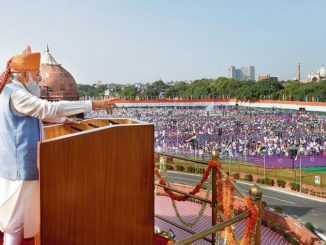
While it could be a curate’s egg for New Delhi, for the world, a return to Obama-era policies may prove inadequate

“India’s pious hope is that the Biden Administration will prove even more favorable to it than the preceding Republican Administration. This may, however, turn out to be like the proverbial curate’s egg — good in parts. Mr. Biden as Vice-President was well known to some of us, as having played a critical role as Chairman of the Senate Foreign Relations Committee in pushing through the iconic U.S.-India civil nuclear agreement, and also as a firm proponent of the India-U.S. strategic partnership.”
“His declaration that the nation was celebrating the triumph of a cause — the cause of democracy was most timely. Among Mr. Biden’s strengths are that he detests bigotry, and abhors identity politics. He tends to be idealistic, and is deeply committed to democratic values. He is a multilateralist, unlike his predecessor, Donald Trump.”
Dispelling very real concerns that existed about disruption of the Inauguration ceremony, Joseph R. Biden Jr was sworn in as the 46th President of the United States on January 20. Memories of the unprecedented events a fortnight earlier, when unruly mobs ran amuck in the Capitol building, seemed to haunt not only those present at the ceremony but also the world at large; Washington had been turned into a fortress for the event. Ultimately, democracy triumphed.
Celebration of democracy
In his Inaugural Address, President Biden struck the right note, delivering a message of unity and hope, while not ignoring the enormous challenges the nation faced. His declaration that the nation was celebrating the triumph of a cause — the cause of democracy was most timely. Among Mr. Biden’s strengths are that he detests bigotry, and abhors identity politics. He tends to be idealistic and is deeply committed to democratic values. He is a multilateralist, unlike his predecessor, Donald Trump.
As the ultimate Beltway insider, he knows better than most, that opposition to many of his ideas and views exist just beyond the horizon. Also, that in seeking to restore the prestige of America’s democracy and revive its economy, he would face many obstacles. He has, however, chosen to gamble on the throw of the dice by issuing a spate of Executive Orders, almost immediately intended to give expression to his initiatives, and also by announcing a series of initial measures which are, as likely as not, to provoke a great deal of opposition. Among these are his proposed $1.9 trillion relief plan to stem the novel coronavirus pandemic, his proposed expansive unemployment benefits package, and raising of the minimum wage, etc.
Policy reset and China
The new President would very soon come to realize that the global environment today is very different from the one that he knew as Vice-President. A return to erstwhile Obama-era policies may, hence, prove inadequate. The world has moved on and several policies will need a reset. The changed scenario, notwithstanding, under President Biden, one can expect the U.S. to rescind the ‘militarization’ of foreign policy reverting to erstwhile traditional diplomacy. Opportunities for a fresh look at many contentious foreign policy issues could well open up as a result, incorporating elements of both competition and cooperation.
The acid test of this would be on how to deal with China. Rising China is not merely the single most serious challenge the U.S. faces at present, but it poses a diplomatic, economic and technological threat to U.S. pre-eminence. Persisting with old-time remedies such as devising an inclusive security architecture in Asia to check an expanding China threat in East Asia could prove counterproductive. Few countries in Asia are willing to line up against neighboring China. This would, thereafter, beg the question as to whether the U.S. should persist with confrontation or attempt conciliation. If the latter, it would require the U.S. to soft-pedal its present antagonistic posture towards China. This could well have global implications.
Next, would be on how best to deal with Russia. The depth of antagonism between the two countries, the U.S. and Russia, remains unchanged, aggravated further by the growing strategic congruence between Russia and China. Initial reactions seem to point to U.S. relations with Russia continuing to remain cold, but as Russia flexes its muscles in Eurasia, the U.S. will need to come up with new policy directives, rather than surrender the initiative to the former.
Ties with Europe, West Asia
President Biden faces an uphill task when it comes to repairing America’s ties with Europe. The days when Europe and the U.S. were tied literally to the same policy cart are over, and Europe is no longer likely to give in to U.S. diktats. Germany is possibly emerging as Europe’s new center of gravity, dictating Europe’s relations with countries such as China and Russia. Germany, while being highly critical of Russia’s human rights record, including the most recent incident of Kremlin critic Alexei Navalny, is not hesitating to go ahead with Nord Stream 2, the Russia-led gas pipeline project, despite the U.S.’s objections. The EU-China Comprehensive Agreement on Investment, again despite the U.S.’s objections, is another indication of Europe’s new independent thinking. European leaders seem more inclined to heed Chinese President Xi Jinping’s warning to global leaders — at the virtual World Economic Forum at Davos, in late January — against ‘starting a new Cold War’, than listen to the U.S.’s Biden.
Problems abound for the new U.S. Administration in West Asia as well. With the civil wars in Syria and Yemen not having ended, the U.S.’s efforts to find a political settlement here will prove difficult. How to deal with a Saudi Arabia that is on a Biden ‘watch-list’, adds to the complexity of dealing with West Asia. The ‘Abraham Accords’, forged during the dying days of the Trump Administration, have further complicated the situation for the incoming Biden government. Dwarfing this would be finding ways and means to deal with the Iran problem, including Iran’s capacity and potential for nuclear mischief. Return to the Joint Comprehensive Plan of Action (JCPOA), or the Iran nuclear deal framework, may not be a realistic option in the wake of the ‘Abraham Accords’, which have imparted a new dynamic and given a sharper edge to the existing Israel-Iran divide.
The outlook for India
India’s pious hope is that the Biden Administration will prove even more favorable to it than the preceding Republican Administration. This may, however, turn out to be like the proverbial curate’s egg — good in parts. Mr. Biden as Vice-President was well known to some of us, as having played a critical role as Chairman of the Senate Foreign Relations Committee in pushing through the iconic U.S.-India civil nuclear agreement, and also as a firm proponent of the India-U.S. strategic partnership. Hence, under a Biden Administration, defense and security cooperation between India and the U.S. are likely to be further stepped up. Regional security cooperation is also likely to be further enhanced, at least till such time as U.S.-China relations improve.
However, a Biden Administration will be far less supportive of India on several issues. India must brace itself to heed concerns being expressed about issues such as Kashmir, the so-called travails of the Muslim minority in India, treatment of non-governmental organizations and the like. This may take place behind closed doors, so as not to embarrass the Indian government, but Biden’s commitment to human rights is, by far, much stronger than that of many recent U.S. Presidents. He can be expected to satisfy his traditional constituency even at the risk of upsetting partners such as India.
What may, however, be far more disconcerting for India, if one were to analyze the statements and views of U.S. Secretary of State Antony John Blinken and U.S. National Security Advisor Jake Sullivan is that while the emphasis on a free and open Indo-Pacific region will continue, countries such as Japan, South Korea and Taiwan are likely to have a far more critical role to play than India in achieving security in the Indo-Pacific. The U.S. could also be less forthcoming in its open support to India and in its ongoing confrontation with China in Eastern Ladakh.
The Afghan plan
Unsatisfactory again from an Indian standpoint are the implications of Mr. Biden’s Afghanistan policy. From positions taken by Mr. Sullivan, it would appear that while some rethinking from the positions taken by the Trump Administration is possible, there is little room for India in the latest plans on the table. Mr. Biden is an ardent advocate of ending the war in Afghanistan — dating back to his years as Vice-President — and he is likely to implement this with vigor, not excluding a deal with the Taliban, the possible exit of elected President Ashraf Ghani, and giving Pakistan an even bigger role in acting as the mid-wife of any new arrangement. Not only would this mean that India’s efforts of the past two decades to restore democracy in Afghanistan would come unstuck, but Pakistan would also gain a degree of legitimacy that had been denied to it by the Trump Administration, encouraging it to act with still greater impunity in carrying out terror strikes on India.
From a restricted standpoint, if India were to balance the positive with the negative and compare the incoming Biden Administration with the previous Trump Administration, the balance sheet could be marginally negative.
(The author is a former National Security Adviser and a former Governor of West Bengal)





Be the first to comment